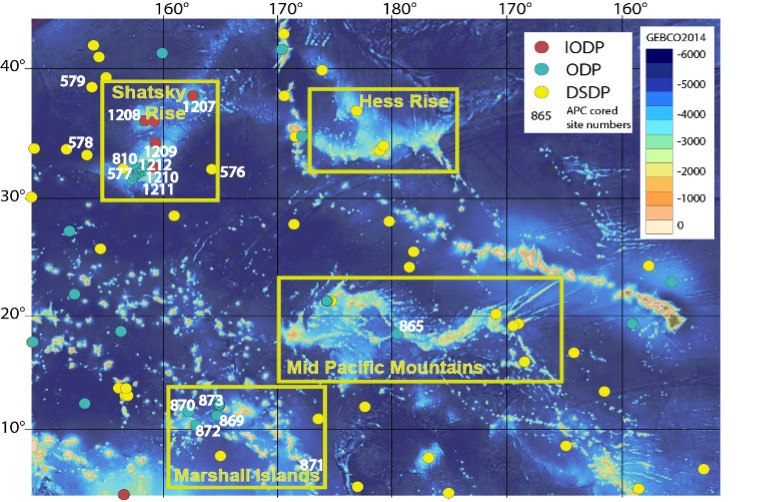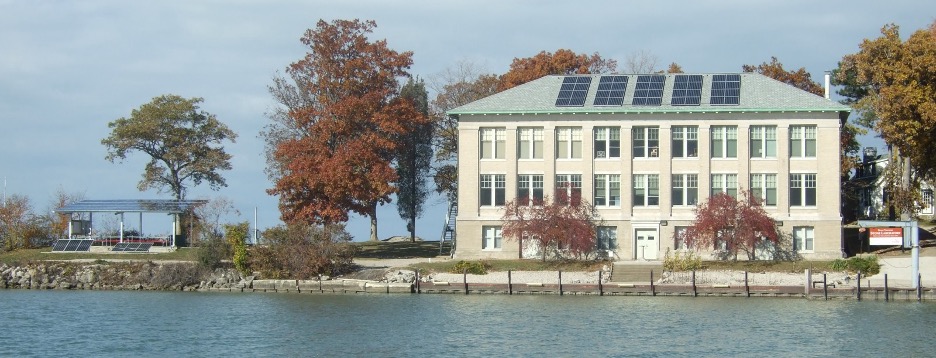Workshop – Targeting Pacific Highs for Past Records of Warm Climates

Date: October 1-4, 2024
Location: Franz Theodore Stone Laboratory, Ohio
Workshop Organizers: Liz Griffith (The Ohio State University), Thomas Westerhold (MARUM-University of Bremen, Germany), Bärbel Hönisch (Lamont-Doherty Earth Observatory), Don Penman (Utah State University), Will Sager (University of Houston), Jim Zachos (University of California, Santa Cruz)
Application period has now closed.
Workshop Resources:
- Workshop Agenda (as of 8/30/24)
- Final Workshop Report (PDF)

The workshop aims to lay out strategies to study, retrieve, and expand paleoclimatic archives of past, warmer-than-today climate intervals, contributing to Flagship Initiative 1, “Ground truthing future climate change,” and Flagship Initiative 4, “Diagnosing ocean health” from the 2050 Science Framework. A more detailed understanding of conditions throughout the Pacific, the largest ocean basin on our planet, is key to probing the stability of past warm climates, resilience of biota during climate disruptions, and evolution of climate sensitivity to various forcings, including changes in ocean productivity and carbon storage. The focus will be to build communities around shared research questions, reexamine available sediments, and develop expedition proposals targeting Pacific Highs such as the Mid-Pacific Mountains. Unconsolidated 100 to 200 meters of pelagic sediment drape deposits on these shallow tropical plateaus (<2km water depth) provide high-resolution windows of time during past warm climates. At these shallow depths, sediment can be well preserved even during peak warming and ocean acidification events, when the carbonate compensation depth (CCD) shoaled and left deeper sediment deposits devoid of the microfossils needed to reconstruct past environmental changes. The deposits on plateaus are typically not continuous over long timescales, but can provide snapshots of past climate conditions that are accessible in 1 to 2 km water depth, e.g., using sea-bed drill rigs.
The workshop provides an opportunity to welcome new scientists into the ocean drilling community, to contribute ideas and expand the use of existing core material – we will consider developing Legacy Assets Projects (LEAP) proposal(s). Due to the non-renewal of operations on the drilling vessel JOIDES Resolution, this workshop will also consider a wider range of alternate or mission-specific scientific ocean drilling platforms, including sea-floor drill rigs that can safely operate in 2 km of water depth. During this time of transition as IODP ends, it is critical to continue engaging a diverse group of researchers invested in the future of scientific ocean drilling. The impact of such efforts covers a range of issues of broad interest to society, including improving climate models, assessing future ocean health, and inspiring future generations through ocean exploration and discovery in alignment with the 2050 Science Framework.
The workshop will bring together a diverse group of scientists to outline plans and strategies to tackle the following goals:
- Identify and refine key scientific questions for past warm climates and targets of analysis that can be addressed by both re-examining existing core material recovered from locations on Pacific Highs and acquiring new material.
- Develop a list of locations that are essential targets to re-examine existing core material and to recover new sediment cores that can provide answers to these key scientific questions.
- Outline a LEAP proposal (or LEAP proposals) and strategies to identify the required drilling platforms (e.g., sea-bed drill rig type expeditions) to successfully recover new material and support these and future efforts given the changing landscape of scientific ocean drilling.
- Draft a white paper that summarizes the workshop findings to coordinate efforts and lay a road map for making progress towards answering the key scientific questions and approaches.
Pacific Highs Workshop Agenda (as of 8/30/24)
The 3-day workshop will include keynote and poster presentations, but the majority of the time will be dedicated to small and large group discussions to identify and build consensus for key open scientific questions and outline strategies to re-examine existing core material (i.e., discuss potential LEAPs), successfully recover new cores, and support these and future efforts given the changing landscape of scientific ocean drilling.
The workshop will take place at Stone Lab, Ohio State’s “island campus” on Gibraltar Island in Lake Erie, which provides a central location with affordable lodging (2-person rooms in dormitory style residences), dining hall, conference room and classrooms for breakouts. The setting provides a unique experience for participants that will foster an intimate and engaged group dynamic. Some time will be spent on exploring the natural surroundings of Gibraltar Island, getting to know each other, and building community, as well as recharging, reflecting and celebrating progress. Participation might require arriving a day early and departing a day after the workshop ends, depending on travel arrangements to and from the islands.
We aim for a total of 30-32 participants, to solicit a broad knowledge base and collectively achieve the goals of the workshop. Participants will primarily be selected based upon their prior research experience and knowledge of the relevant literature to contribute novel ideas and design ambitious projects and proposals. Applicants will need to submit a statement of interest, including prior expertise specific to the workshop topic if applicable, and a CV. Students will need to also provide the name and contact information for a reference. Criteria for participation will include: (1) interest or expertise in some aspect of the workshop topic, and (2) collegiality, as it pertains to active and respectful participation in discussions, proposal writing and research planning, as well as an expressed motivation to contribute to diversity, equity and inclusion.
The application form can be found here. The deadline to apply will be July 25th, 2024, and invitations to participate will be sent early August. Applications will be used to guide participant selection. Travel support is available from U.S. Science Support Program (USSSP) for U.S.-based participants. International applicants should contact their program member offices and/or workshop organizer Thomas Westerhold.






